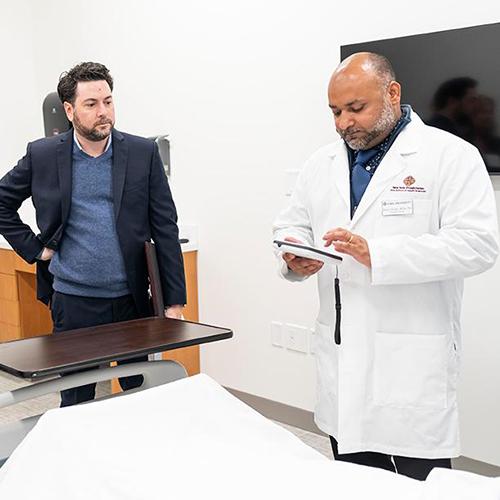What is Leadership in Health Care?
Due to the complexities of the health services field, there is no simple distillation of leadership in health care. Health care organizations are large, complex and highly logistical facilities. They are composed of large staffs, have multi-million dollar budgets and sustain the health and wellness of a community by providing life-saving and routine medical services.
For these facilities to operate smoothly and meet ever-evolving public health needs, strong leadership is critically important. However, there is not a singular correct way to lead in health care; rather, there are many demonstrations of impactful health care leadership. That is because the medical field is a diverse workforce, and those who fill leadership positions come from many different backgrounds, hold a variety of job titles with wide-ranging responsibilities and have distinct leadership styles.
What is a Health Care Leader?
Although it is a broad term that encompasses many careers, health care leaders take on the business management responsibilities of health care organizations, such as hospitals, nursing homes, outpatient facilities and more.
Health care leaders are not responsible for directly administering medical care to patients. Instead, they serve their organization and patients by guiding major business decisions, ensuring the facility runs efficiently and is well-staffed and setting strong organizational objectives and goals so their facility matches the growth of the health services industry.
With their blended expertise of health care knowledge and business insight, health care leaders are important and formative influences on the medical field, both locally and nationally.
Leadership Roles in Health Care
Every health care facility, whether it is a birthing center or mental health and addiction treatment center, needs a strong leader to navigate challenges and set the facility, its staff and its patients on a path to success. Health care leaders can be classified under a variety of titles, such as:
- Administration Supervisor
- Clinical Director
- Hospital CEO
- Health Information Manager
- Medical Services Management
- Social Service Manager
Regardless of job title and variations in responsibilities, health care leaders have the unique task of blending business savviness with their health service expertise. By using both types of knowledge to inform their management style and decision-making, health leaders can position their facility to expand and stay up-to-date with ongoing technological advances and regulatory changes in the medical field.
What Does a Health Care Leader Do?
While the needs of a health care organization will ultimately dictate specific job responsibilities, health care leaders are primarily accountable for essential and higher-level business management duties, such as:
- ensuring their facility or organization complies with current laws and regulations;
- implementing best practices so patients receive quality care;
- managing information systems;
- strategizing new initiatives to meet objectives;
- maintaining accurate personnel and financial records;
- managing organization finances and budgets;
- overseeing human resources, including hiring and scheduling;
- facilitating internal and external communications;
- nurturing relationships with other organizations, health care providers and the community at large.
Without careful attention to these business logistics, health care facilities could not function efficiently. Health leaders work tirelessly to ensure operations are up and running so patients can receive the quality care they need.
Health Care Leadership Skills
Serving in any health care leadership position requires a diverse skill set. Health care leadership roles require well-developed interpersonal skills. Whether you are a clinical director or an administrative coordinator, your job involves close collaboration with others. Leading with empathy, inclusivity and humility helps to create a healthy work environment and instills value into the staff. Overall, this nurtures satisfied employees who produce great work, which, in turn, supports the success of your facility.
Since health care leaders are responsible for communicating with staff about operational updates or policy changes, navigating conflict resolution with care and connecting with external organizations to foster lasting community relationships, they must possess strong communication skills. This ensures staff remains informed, there are clearly defined objectives and community relationships and the organization continues to operate effectively.
Lastly, working in health care is stressful and involves high stakes, but health leaders must be strategic thinkers even in high-pressure situations. Drawing from their industry expertise and strong data analysis skills, they are equipped to make quick but data-based decisions for the betterment of their staff and their facility.
Education Required to Become a Health Care Leader
For most health care leader careers, the minimum education requirement is a bachelor’s degree. Those who are interested in health care leadership positions typically earn a bachelor’s degree in healthcare administration, public health or business administration.
Health care leaders emerge from a variety of backgrounds; some may be experienced medical workers, while others may come from the business sector. In both cases, further education may be required to round out their knowledge and skill set. Likewise, it is common for advanced health care leadership positions to require graduate education and more extensive experience.
Those coming from a medical background have clinical expertise and first-hand industry knowledge but need to develop their business acumen. On the other hand, individuals with business experience have well-developed managerial skills but need to learn more about the intricacies of the health service industry.
To further develop business expertise and their understanding of how the medical field functions, aspiring health care leaders may choose to pursue graduate-level education. Many colleges and universities offer a variation of a master’s degree in health care administration or medical and health service management as well as health care management certificates. Depending on the college or university, these certification programs may be completed as a standalone certificate, or they can be included as part of an MBA program.
Employment Demand for Health Care Leaders
The U.S. Bureau of Labor Statistics (BLS) projects the employment of medical and health service managers—such as nursing home administrators, clinical administrators or health information managers—to increase by 28 percent annually. This equates to approximately 56,600 jobs opening each year. Comparatively, the average projected growth for most other occupations is five percent. With such rapid expansion, health care organizations will need robust leaders to fill these new positions and guide health care organizations through a quickly changing career field.
The average annual salary for medical and health services managers is $101,340. There are variances in earning potential, typically based on the type of health care facility. Those working in state, local and private hospitals earn $119,450 on average, while those working in nursing and residential care facilities may earn $83,550.
Become a Health Care Leader at Iona University
Iona University’s graduate Health Care Management Certificate equips students with the managerial skills and industry expertise they need to advance their careers and assume leadership roles in health care organizations.
Designed for working professionals, students can select from in-person, online or hybrid courses and can earn their Health Care Management Certificate in six to 12 months. Depending on your goals, our graduate-level advanced certificate can be completed as a standalone professional development certificate, or it can be incorporated into Iona’s Master of Business Administration (MBA) degree.
To prepare students for the responsibilities and challenges of serving in health care leadership positions, the certificate program’s curriculum offers a broad range of courses in rotation, including:
- Health Care Law and Ethics
- Health Care Finance
- Health Care Management
- Public Health Issues
- Health Industry Analysis
- Ambulatory Care
Our business programs are accredited by the Association to Advance Collegiate Schools of Business (AACSB)—a highly acclaimed distinction awarded to just six percent of business schools worldwide.
With Iona’s Health Care Management Certificate, you receive the quality training and faculty mentorship needed to elevate your career options and become a health care leader.
To learn more about Iona’s graduate business programs, request more information.






